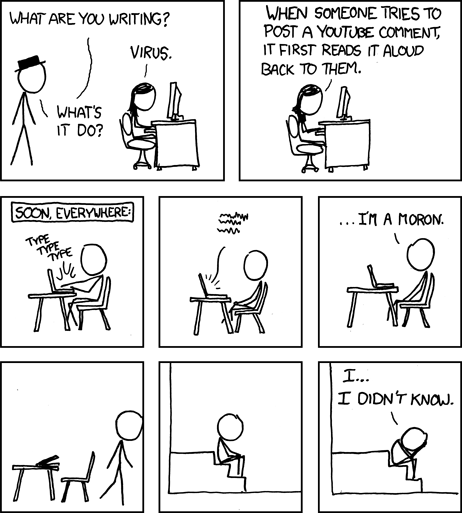A couple of caveats on top –
- I have a very hard time writing about learning concisely.
- I don’t have a computer right now and I am writing this on a tablet. So far, in my experience, WordPress on a tablet doesn’t mesh well with #1. Fair warning.
So #1 + #2 = I’m focusing on one pitfall — one that I’ve been struggling with for a while – how to foster collaborative learning in the online environment.
Like a lot of others, I’ve used discussion boards and I have a lot of experience with discussions that didn’t work out quite like I’d hoped – long lists of replies that don’t go beyond “I agree,” or “I liked Sue’s post,” discussions that read like a series of disconnected opinions, or discussions that never get off the ground because all of the posts come in an hour before the deadline.
But maybe a hurdle here is that I’m trying to figure out how to replicate in-class discussion.
As a librarian, I know that knowing how to learn online — from people as well as from texts — is an essential skill. Looking at that real-world context, I see two main ways that people engage and learn online and I think these translate pretty well to the classroom too —
- Interacting with people different than me, I am being pushed to see things from another perspective or to consider topics I’ve never considered.
AND
- I have a question, I need help to answer it.
The replicating-class-discussions problems are mostly tied up in that first way of learning — and that’s a really tough one in out-of-classroom contexts too, as anyone who has ever been sucked into an unmoderated online comment section can attest.
So maybe instead, it would be helpful to start with the other type of questions — the simpler ones that fall under I have a question, I need help to answer it.
These are situations where someone has a pretty specific, defined need and they need a piece of information, an opinion, a visual or something to fill that need. This could be something they could just access — like this blog post about repainting Ikea furniture, or they might need to find a person, or a community. This is really common in the world of technology troubleshooting.
This kind of learning is important. It does take some skill. And it’s not hard to motivate people to engage in it, at least as learners who are already self-motivated by their own need for the information. And once you’re part of a community, it’s pretty common to want to give back – to answer questions on the forums, or to put up your own posts when you’re the one that figures out how to do the thing. When you’re a part of the community, you know what’ll be useful, what’s likely to get you a positive reaction.
This gives me some ideas for my hybrid U-Engage course.
There might be value in talking explicitly to students about creating and finding learning communities, showing examples of how that works (and having them share their own experience) before setting up part of the class discussion board for this purpose.
Asking students to create digital content that shows how they solved a problem common to people in the class community seems like a potentially fruitful way to start getting them engaged with the idea of teaching and learning online.
Additional thoughts –
In some ways, this seems particularly interesting in a U-Engage class because the “how to” or “DIY” content could be grounded in the subject material of the class (digital remixing), or it could be about all of the How to Be an OSU Student skills that are part of the first-year experience program.
This raises the thought of audience — problems that come up because of the subject matter of this specific course might be better handled within the familiar class community — on Blackboard or some other shared site. On the other hand, the best audience for How to Navigate OSU strategies would probably be broader than that — publishing somewhere more open is potentially riskier, but might make that kind of activity feel more authentic.
Of course, this doesn’t really get at the issues raised at the beginning because this kind of learning isn’t the challenging, potentially risky learning that we’re usually hoping to spark in class discussions. I am starting to have thoughts about this kind of learning too. But I don’t think I’m going to get there in this post — it’s long enough already.



